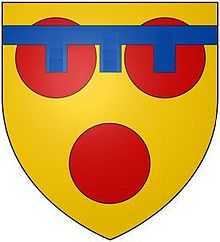Sir William Courtenay, 1st Baronet
Sir William Courtenay, 1st Baronet (7 September 1628 – 1 August 1702) was an English politician.
Origins
Courtenay was the eldest son and heir of Francis Courtenay (d.1638) of Powderham Castle by his second wife Elizabeth Seymour, daughter of Sir Edward Seymour, 2nd Baronet.
Career
He was created a baronet in 1644 by King Charles I but disdained the newly invented variety of title, perhaps on political grounds, and never took out a patent. He was therefore not included in the list of baronets, although the king styled his as such in his commissions.[1]
On 2 April 1660, Courtenay became the Member of Parliament (MP) for Ashburton, Devon.[2] However, he retired from politics after the Restoration and appears not to have been returned in 1661. In 1664 he served as High Sheriff of Devon.[2] In 1677 Courtenay's health prevented him standing for Ashburton but he managed the campaign of the country party. The country party's candidate was unsuccessful, but the government supporters admitted that in a clean election Courtenay's campaign had been very moderate. Notwithstanding that, he had made a new freeholder and "drank him so freely" that he fell downstairs and broke his neck.[2] On 18 February 1679, Courtenay became MP for Devon until 1685. His health prevented him standing in 1688.[2]
After the Glorious Revolution of 1688, Courtenay funded a lavish reception at Forde House, Wolborough, for William of Orange and his council, who had just landed nearby at Torbay. He was not himself present as host, having felt it prudent not to associate himself too strongly to the new regime should it fail. The chair on which the future King William III sat during his first Council of State at Forde is now displayed in the Dining Hall of Powderham Castle.[3]
Marriage & progeny
Courtenay married Margaret Waller (d.1694), daughter of Sir William Waller, a parliamentary general in the Civil War, and eventual heiress of her maternal grandfather Sir Richard Reynell (d.1633) of Forde, Wolborough, Devon, where he had built a new mansion in about 1610. Forde became the couple's main home, possibly due to the damage suffered by Powderham Castle during the Civil War, it having been captured on 25 January 1646 from the Royalist garrison by the parliamentarian forces under Col. Robert Hammond. Certainly Sir William and his wife were buried at Wolborough and several of their children were baptised there.[4] They had eight children:[5]
- Col. Francis Courtenay (1651–1699), eldest son, who predeceased his father. He married in 1670 Mary Boevey, daughter of William Boevey (d.1661), a merchant of Dutch ancestry, of Flaxley Abbey, Gloucestershire, brother of the merchant, lawyer, philosopher and pioneering developer of Exmoor, James Boevey (1622-1696). His eldest son and thus heir to his grandfather was Sir William Courtenay, 2nd Baronet (1675–1735) de jure 6th Earl of Devon.
- James Courtenay (1655–1727), of Walreddon, Witchurch, Devon. He married Elizabeth Bourbon in 1682.
- George Courtenay (born 1657), MP of Fitzford, Devon.
- Richard Courtenay (died 1696), married Katherine Waller.
- William Courtenay (died 1703), MP for Devon.[1] Married Susanna Kellond.
- Elizabeth Courtenay, married John Clobery in 1673.
- Margaret Courtenay (1663–1755), married Edmund Reynell.
- Jane Courtenay (born 1664), married John Rowe in 1687.
Death & burial
Courtenay died aged 73 and was buried at Wolborough, the parish church of Forde House.[4]
Succession
He was succeeded by his grandson Sir William Courtenay, 2nd Baronet (1675–1735) de jure 6th Earl of Devon.
References
- ↑ 1.0 1.1 John Burke A General and heraldic dictionary of the peerage and baronetage of the British Empire, Volume 1
- ↑ 2.0 2.1 2.2 2.3 History of Parliament Online - Courtenay, Sir William
- ↑ Powderham Castle guide book, ed. French, Daniel, 2011, p.10
- ↑ 4.0 4.1 Vivian, Visitations of Devon, 1895, pp.247-8, pedigree of Courtenay
- ↑ Rutland 8: Descendants of William the Conqueror http://www.william1.co.uk/r7.htm#r7l16
| Peerage of England | ||
|---|---|---|
| Preceded by Francis Courtenay |
Earl of Devon de jure 1638 – 1702 |
Succeeded by Sir William Courtenay, Bt |
| New title | Baronet Courtenay 1644 – 1702 | |
